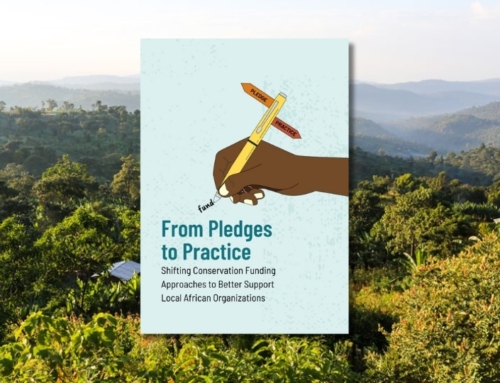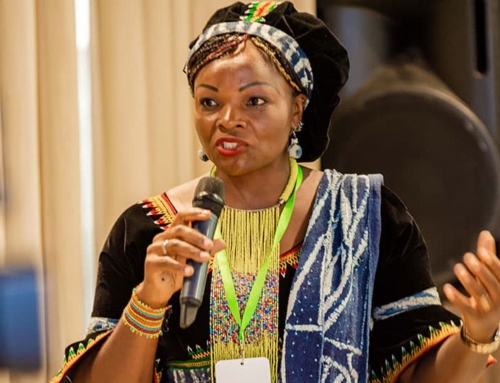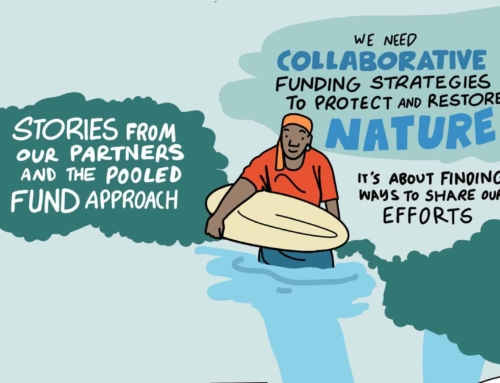Pooled funding – where several donors and foundations contribute funds to a central pot – can reduce the burden on small, local organisations who might otherwise have to use vital resources filling in multiple grant applications and writing reports for numerous different donors. In this post, Synchronicity Earth CEO Catherine Bryan explains how a pooled funding approach is helping one of our partners working in the Democratic Republic of the Congo to protect species diversity and support local communities.
Mbou Mon Tour (MMT) is a community organisation working to protect the forest-savanna habitat of bonobos and improve livelihoods and food security in Mai Ndombe Province in the Democratic Republic of Congo (DRC). It has a small permanent staff and relies heavily on committed volunteers from the villages where it works. The work of organisations such as MMT is vital in the Congo Basin, both to conserve its stunning biodiversity, but also to protect and improve the livelihoods of local communities. Nevertheless, as a small, local organisation MMT does not have the resources or profile to attract and coordinate international funders, so the question is:
How can such a small – but vital – organisation attract the funding it needs and stay focused on its work without the burden of writing countless applications and reports for multiple donors?
This is where a pooled funding approach comes in.
How pooled funding works
All our programmes take a ‘pooled’ funding approach. Each donation to a programme is managed alongside other donations, allowing funding to be allocated more strategically to our partner grantees. Our Congo Basin programme specifically sets out to build the capacity and impact of local organisations, so the last thing we want to do is place a heavy administrative burden on them. Our experience has shown that a pooled funding approach is a ‘win-win’ for both grantee and donor. For the grantee, it means less time spent fundraising and completing paperwork; and done well it also means more opportunity to collaborate and learn from other grantees. For the donor, it offers an opportunity to learn about and fund grantees in areas previously inaccessible to them: not all donors or indeed foundations have the capacity to research a region themselves, identify good partners or conduct due diligence, let alone build long-term relationships with grantees.

A juvenile male bonobo. Image © MMT
Our Research Team at Synchronicity Earth has carried out analysis to understand the threats that the natural world is facing in this region and identified organisations working to address these threats. This analysis has shown that philanthropic funding for conservation work in the Congo Basin is much lower than that for the Amazon or Southeast Asian forests. Protecting the Congo Basin is crucial if we are to combat climate breakdown and counter biodiversity loss. The groundwork done by our research team has helped us to raise pooled funding from three other foundations who have also recognised that the conservation of this region is a priority.
As we grow our programmes, we want to share our analysis and learning. Through our programmes, any donor can effectively participate in this ‘pooled funding’ approach. By donating to a programme a donor joins forces with others. Their donation is allocated to the most pressing needs and they receive a report on the impact of the full programme and all the beneficiaries within it. It truly increases support without increasing the load for the great organisations we fund.
Increasing impact on the ground

MMT works with Bateke communities in Mai-Ndombe province (DRC), cultivating 8 types of vegetable in family gardens. Image © MMT
The nine team members at MMT cover a wide range of work and the pooled funding we provide allows them to spend more time in the field working with communities, whilst receiving support from an increasing number of donors. This work includes collaboration with Bateke communities in six villages, helping them to establish six community forests, three of which specifically protect bonobos and their habitat. MMT employs 18 trackers from these villages to monitor the bonobos. The trackers also collect snares laid by hunters for other species, which can badly injure, or even kill, bonobos. They have collected 63 snares over the past year and encouragingly there have been no recent incidences of bonobo poaching recorded.
MMT has also established a pilot agroecology plot to promote more nature-friendly, diverse approaches to food production, improving both the nutritional value of the food grown and increasing the incomes of local people from produce sales.
Increased pooled funding through our programme is helping MMT to protect this important habitat and ensure the long-term wellbeing of the people and species, including bonobos, that depend on it.
As the work evolves, what we learn is helping not just to leverage more pooled funding, but also to inform our support for other partners across our programme.





